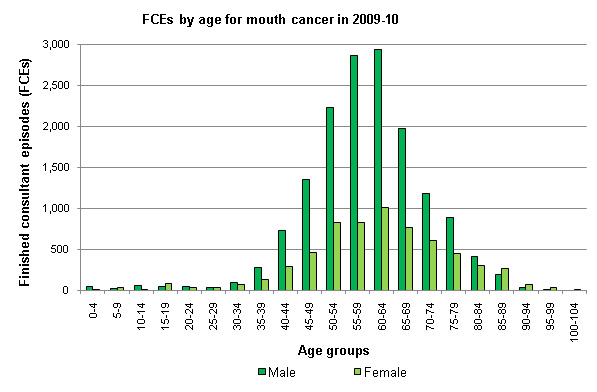IN THIS SITE...

- NHS Choices: Mouth Cancer
- Inpatient data
- Self Service
HES on... Mouth cancer
According to NHS choices mouth cancer is two to three times more common in men than women. This article gives an overview of the condition and highlights related 2009-10 HES data.
What is mouth cancer?
Mouth cancer can appear in different forms and can affect all parts of the mouth including the tongue and lips. Most cases of mouth cancer are linked to tobacco and alcohol use. If consumed together the risk is much greater. Early diagnosis of mouth cancer is important so as to maximise the benefit of any treatment and reduce the chances of the cancer spreading to other parts of the body.
Who does it affect?
Anyone can be affected by mouth cancer. According to the British Dental Health Foundation there are, on average, over 4,400 new cases and nearly 1,700 deaths from the disease every year in the UK.
 |
Mouth cancer is more common in people over 40, particularly men. There is a prominent peak in hospital treatments for those in the 55 to 64 age groups.
HES facts and figures
HES data for mouth cancer (diagnosis codes C00-C14 in ICD-10) show that:
- most hospital admissions for mouth cancer are from waiting lists rather than emergency admissions
- the average (mean) time patients remained in hospital varied from 3.9 days in the case of malignant neoplasm of tonsil (C09 in ICD-10) to 9.2 days in the case of malignant neoplasm of the hypopharynx (C13 in ICD-10)
- where procedures were carried out on admitted patients, the most common were:
- procurement of drugs for chemotherapy for neoplasm for regimens in Band 1 (X70.1 in OPCS 4.6) 2,846 (13.0%)
- procurement of drugs for chemotherapy for neoplasm for regimens in Band 2 (X70.2 in OPCS 4.6) 1,203 (5.5%)
- fibreoptic endoscopic percutaneous insertion of gastrostomy (G44.5 in OPCS 4.6) 1,139 (5.2%).
- mouth cancer was responsible for 21,925 episodes of admitted care, accounting for 87,680 FCE bed days.
Please note: These figures may not account for additional admitted bed days for reconstructive surgery and rehabilitation.
More information on this topic is available from NHS Choices here.

